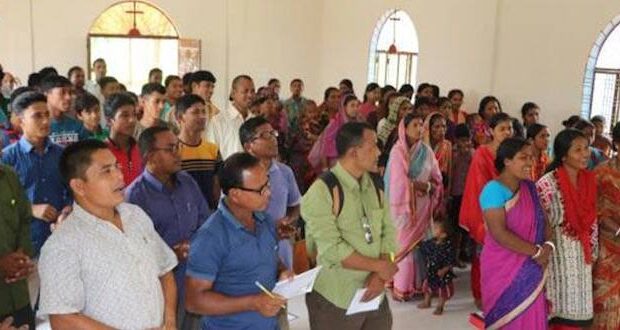Bangladeshi Christians, and other minority groups, took to the streets of Dhaka in a 500-strong peaceful protest march on Nov. 7 against relentless Islamist extremist attacks on minority communities.
Rana Dasgupto, the Secretary General of the Bangladesh Hindu, Bouddha, Christian Oikya Parishad (BHBCOP), the march organizers, stated that at least 17 people from ethnic and religious minority communities were killed between March and September this year, with attacks continuing throughout the Covid crisis.
The protesters say that the Islamist attacks against minority communities ‘‘hurt religious feelings’’, and minority leaders claimed that communities are living with “uncertainty” because “the government failed to protect them’’.
A placard stating, ‘‘Stop Using Facebook for Community Attack” highlighted the role of social media in persecution-related incidents, with some arrests of Hindu students made after accusations of “offending religious sentiment” in Facebook comments.
The 1 percent Christian minority has typically enjoyed greater religious freedom in Bangladesh than in many other Muslim-majority countries but, along with the 9% Hindu and small Buddhist populations, is subject to discrimination from the 90% Muslim majority. Violence against Christians, particularly in rural areas, has been growing, with those active in evangelism and converts from Islam particularly targeted. The country’s constitution gives religious minorities the right to practise and share their faith, but Islam is the state religion.
According to OpenDoors, “Christians are a tiny minority and, if they belong to ethnic minorities, face a double vulnerability. Christian converts come under pressure from either radical Islamic groups or the Islamic culture in their neighborhoods and often face significant threats. Churches and all minority religions strive to stay clear of politics.”
The ministry goes on to state that, “Converts from a Muslim, Hindu, Buddhist or an ethnic/tribal background suffer the most severe persecution in Bangladesh. Evangelistic churches, many of them Pentecostal, working among the Muslim majority face persecution, but even historical churches such as the Roman Catholic Church are increasingly faced with attacks and death threats.”
–Metro Voice and Barnabas Fund
 Metro Voice News Celebrating Faith, Family & Community
Metro Voice News Celebrating Faith, Family & Community









